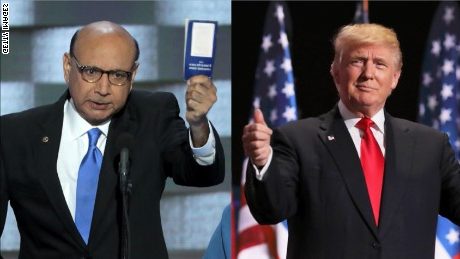 The debate on Muslims’ role in American life has returned to the centre of the US presidential election campaign because of Donald Trump’s ugly public spat with a family named Khan.
The debate on Muslims’ role in American life has returned to the centre of the US presidential election campaign because of Donald Trump’s ugly public spat with a family named Khan.
This is no ordinary family in an America that has been ceaselessly at war for 15 years. Khizr and Ghazala Khan, originally from Pakistan, lost a son in Iraq in 2004. The couple has lodged the most direct and personal challenge so far to the Republican presidential nominee’s rhetoric concerning Muslim immigrants in America.
Trump’s America, they said, would have denied their 2-year-old son entry on account of his religion. As patriotic American Muslims, they added, Trump’s Islamophobic statements and proposals were profoundly offensive and unconstitutional to boot.
Trump responded harshly, even cruelly, attacking the Khans for speaking out. They had “no right”, he said, to criticise him.
The row prompted a loaded question: Would the famously politically incorrect Trump have dared to behave with such callousness had the Khan family’s name been Kahn? Or Kuhn? Or Cohen?
Probably not. So why should the Muslim immigrant parents of a decorated American soldier be considered fair game? How could a man who hopes to be president of America, a country built on diversity rather than defined by blood or a single religious tradition, be so disdainful of an American Muslim family’s bereavement? Why did Trump and his senior aides persist in repeating the mantra “radical Islamic terrorism” in response to every media question on the Khans? What does “radical Islamic terrorism”, a cornerstone of the Trump campaign rhetoric, have to do with law-abiding middle-class people such as the Khans? What does terrorism per se have to do with the parents of a man who died while fighting one of America’s wars?
All five questions have a single-word answer: Muslim. The Khans are Muslim. So was their son Humayun.
In Trumpland, it does not seem to matter that Khizr Khan is a lawyer with a declared and transparent devotion to the US constitution. And that Humayun was inspired by the words of Thomas Jefferson, principal author of the American Declaration of Independence. In Trumpland, the Khans’ Muslim faith seems to overshadow their patriotic avowal of fealty to America, making them inherently foreign and un-American.
Consider the way Trump and some of his supporters have tried to turn the tables on the Khans. Trump questioned the bereaved mother’s silence as her husband spoke, evoking an anti-Muslim stereotype of oppressed womanhood. Some Trump supporters, including the Republican nominee’s long-time mass garbage-dispersal agent Roger Stone, have circulated unsubstantiated accusations about Khizr Khan from an Islamophobic website. The elder Khan was smeared as a “Muslim Brotherhood agent who wants to advance sharia law”.
This would be mildly amusing if it were not deeply tragic. The Khans lost a part of themselves — their child — for the sake of their adopted country, an amputation they bravely accepted. They are a Gold Star family, which is to say one whose son died in the service of America and on whom the US military conferred a special award in recognition of their sacrifice. What more can the United States, Donald Trump, or anyone really, ask?
So, will Trump suffer the consequences of having transgressed one of America’s biggest traditions — unqualified respect for those who serve and fall in distant battlefields? It would be spectacular, wrote one anti- Trump conservative-leaning commentator in Washington, and an “instance of political karma if after smearing all Muslims and attacking their patriotism, Trump would see two patriotic Muslim parents hammer the final nails in his campaign coffin”.
Perhaps. Perhaps, Trump will lose on November 8th but do not bet on it. And do not bet on his core supporters deserting him for being obnoxious to the Khans. Trump’s voters seem determined to stick by him. They have done so all along, even when he mocked a disabled reporter, slagged off women and politicised an ongoing court case by questioning the impartiality of an ethnic Hispanic US-born judge. Each time, Trump supporters cheered because he seemed to be challenging an elite-driven political correctness.
As veteran Republican Party pollster Frank Luntz told the Washington Post about Trump’s feud with the Khans: “There are millions of voters who are willing to ignore their discomfort because he (Trump) is the candidate of change.” To his fans, Trump is the anti-politician who says what everyone is thinking.
There’s another reason that Trump’s support seems shockproof. His ignorant Islamophobia has resonance with “a fearful and unknowing (American) public” in the words of Haroon Moghul, president of Avenue Meem, a platform for telling American Muslim stories. In America today, Islamophobia is like racism, Moghul recently said, “not because Islam is a race but because, for the Islamophobe, Islam plays the same role race did for racists. It’s all about broad, sweeping, malicious judgments.”
This is why it may come to pass that the Khan-Trump feud is reduced to a minor footnote in an epic electoral battle for the soul of America.

